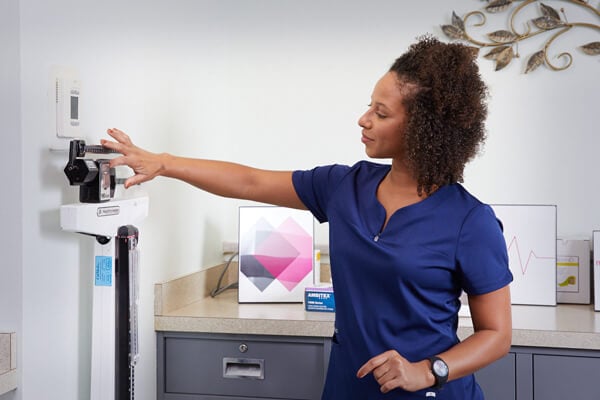Written by Sara Piercy, DNP, FNP-C
Finishing nursing school, passing boards, and getting your first job as a new nurse is so exciting! Once you hit the unit running in your scrubs uniform, it’s normal for that familiar feeling creeping in where you say, "I didn’t learn any of this in nursing school!”. Those first couple of months (really the first year or so!) at your first nursing job can be so hard. It can be very intimidating trying to learn things that you definitely did not learn in nursing school, figuring out how to stay organized and efficient, and learning how to talk in this new “hospital” language to coworkers.
With these tips and some practice, you will settle into your job and wear your favorite medical scrubs with confidence.
Organization
You will not be efficient at your job if you have things written down in random places (including paper towels and torn off pieces of tape!), papers flying everywhere, and no process for keeping track of your patients. Find a strategy that works for you and stick with it. It can be very useful to utilize a report sheet format that you can follow for each patient where you have certain things written every time. There are many examples of these online, and your coworkers likely have some formats they can share with you. Look at the examples and either pick one or make one for yourself that will help you stay focused and organized.
Read the Chart
Even if you get a good report from the previous shift, make sure you read the chart. Most importantly, read the provider notes. The History and Physical (H&P) note on admission paints a picture of what brought the patient to the hospital. The daily progress notes gives you updates from the provider’s viewpoint on the patient’s progress and the plan of care. It is vital that nurses read these notes. Nurses being informed of the provider’s plan helps ensure that everyone is on the same page. On the other hand, nurses spend the majority of the time with patients, and if they see a discrepancy between what is going on with the patient versus what is in the chart, they can bring it to the provider’s attention. Make sure to read other ancillary department’s notes about the patient, such as case management and therapy departments.
Communicating with Providers
Providers should be rounding and touching base with the nurse when they are on the unit. Sometimes, however, it is necessary to call the provider to update them on the patient’s condition, the plan, ask a question, clarify an order, or for other various reasons.
Always have a few things ready to discuss when speaking with the provider.
When you call a provider, you should have read the most recent notes in the chart, know current orders (including as needed (PRN) orders), and pending or upcoming tests or procedures already ordered. Looking through the chart often answers the question for you that you are calling to ask. Have the patient’s chart pulled up and accessible, complete with a new, fresh set of vital signs. Providers may ask you questions ok such as recent lab values, most recent blood sugar, etc. Make sure this information is readily available so they can do their job efficiently.
You've got this.
All nurses were brand new nurses at some point. Being a nurse is unlike anything else. No one can truly understand what this profession is like unless they have pulled on nurse scrubs and jumped into this role before. It may help to join local and national nursing organizations to connect to new nurses like you. While you are a new nurse trying to find your footing, nursing can seem like an impossible task at times. Being a great nurse is a learning curve, but once you get the hang of it, it can be one of the most rewarding careers.
Stick with it and you will become a pro in no time!
About the Author:
Sara Piercy is a doctoral prepared certified nurse practitioner with experience in the hospital setting in rural North Carolina. She is also adjunct faculty at a local university for a graduate nursing program. She enjoys educating patients and has a particular interest in cardiac and neurology patients.




